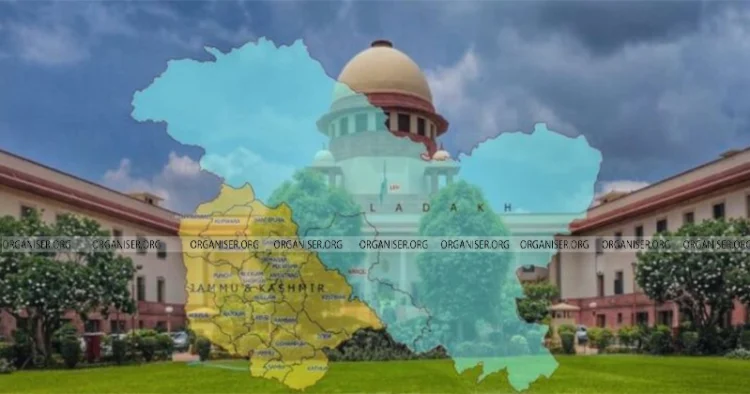On August 23, the Government of India informed the Supreme Court that it has no intention to interfere with the special provisions applicable to the North-East or other parts of India while the court was hearing the Article 370 case.
The court’s Constitution Bench, comprising Chief Justice of India DY Chandrachud, Justice SK Kaul, Justice Sanjiv Khanna, Justice BR Gavai and Justice Surya Kant, disposed of the intervention application moved by an Arunachal Pradesh politician. The court was hearing a batch of petitions challenging the amendment of Article 370 and abrogation of the special status of the erstwhile State of Jammu & Kashmir.
The Arunachal Pradesh politician’s counsel, Senior Advocate Manish Tiwari, voiced apprehensions about the government abrogating the special provisions applicable to North-East India as the government amended Article 370 and abrogated the special status of J&K. He informed the court that there are special provisions such as Article 371 and Sixth Schedule of the Constitution of India.
“Even a slight apprehension in the periphery of India can have serious implications. Your lordships are currently dealing with one such situation in Manipur,” the counsel said.
However, the Solicitor General of India Tushar Mehta interjected and said that there is a difference between Article 370, which gave special status to J&K, and special provisions with regard to North East India. The SG further informed the court that the government has no intention to touch the special provisions of the North East or other regions.
“I have instructions to say this. We must understand the difference between temporary provision which is Article 370 and special provisions with regards to the north east. The Central government has no intention to touch any part which gives special provisions to North East and other regions,” the SG submitted.
Furthermore, the SG said that Manish Tiwari’s submission has a “very potential mischief” and that there is “no apprehension and there is no need to create apprehension.” However, Tiwari submitted that his submission was not in reference to the current Union Government but was addressing the larger principle at stake.
The Chief Justice informed the politician’s counsel that the court is dealing with the case concerning the amendment of Article 370 and that it does not have to expand its ambit on impact.
“Why should we deal with anything in anticipation or apprehension? We are dealing with a specific provision of Art 370. We don’t have to expand the ambit on impact,” the CJI said.
Furthermore, the Chief Justice noted that the Solicitor General had informed the court that the Government of India has no intention to take away special provisions of the North East, then the court should not enter the sphere. The court said that the apprehensions had been allayed by the Government of India’s statement.
“When as a constitutional principle the SG has informed us that the government has no such intention, why should we apprehend this at all? We should not enter that territory at all. The impact of abrogation – that point has been made. Let’s not focus on North East like this. The apprehensions are allayed by the statement of the Central Government,” CJI said.
The court disposed of the intervention application after recording the Solicitor General’s statements. The court said in the order, “The applicant has urged that apart from the provisions contained in Part XXI of the Constitution pertaining to J&K, there are special provisions governing the North East. Hence, it is submitted that the interpretation by this court in Article 370 would impact other provisions. Solicitor General has submitted on specific instructions that the Union Government has no intention to affect any of the special provisions applicable to North east or any part of India. The reference of this case is confined to Article 370. There is no commonality of interest in the Interlocutory Application and the case being heard. In any event, SG’s statement on behalf of the Union, allays any apprehension in this regard. Thus, the IA stands disposed of”




















Comments